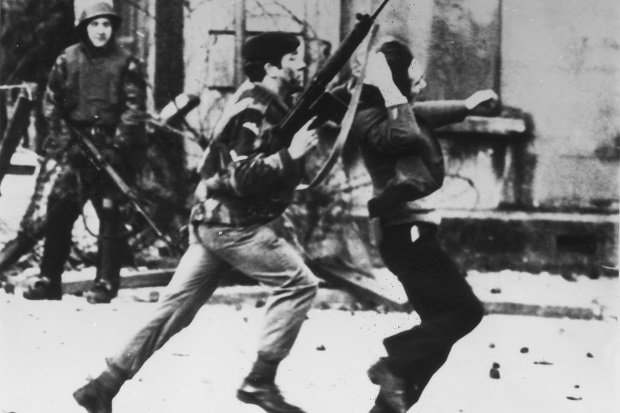The front-page of yesterday’s Sunday Times carried the news that up to 20 retired members of the British Armed forces are likely to be taken in for questioning in relation to the deaths of 30th January 1972, known as ‘Bloody Sunday’.
Some readers will know that I have taken a great interest in this case and have written a book which I don’t think spares many details on what specific soldiers of 1st Battalion of the Parachute Regiment, among others, did that day. In certain cases – including that of at least one soldier who is still alive (‘Soldier F’) – I do not hesitate to call what they did ‘murder’.
But the process from here is fraught with difficulty. Several commentators have already said that the soldiers were promised that no further action would arise if they gave evidence to Lord Saville’s long-running inquiry, which is not quite the case. The Public Interest Immunity certificate only covered people who were found to have told the truth to the inquiry. So if Soldier F had turned up and said, ‘Fair enough, here after 30 years is exactly what I did that day’ then the matter would be settled and no action could be taken against him. But Soldier F and others clearly did not do that. They lied to, and otherwise misled, a hugely costly inquiry set up by the British Prime Minister to find the full truth of what happened that day. It cannot be the case that this should go entirely unpunished.
But there is an obvious and glaring problem – and it is one of simple fairness. Throughout the decades of the Troubles, paramilitary organisations – terrorists – killed far more people than the British Army ever did. Very many of these deaths are still unaccounted for and unpunished. Few, if any, have any real likelihood of coming to trial now.
And although I am all for the argument that we should hold members of our own armed forces to a higher standard than we should, say, members of paramilitary organisations, the argument is based on the fact that they operate on behalf of the state and that the state itself is harmed by leaving such wrongdoing unpunished. Yet Martin McGuinness is also now part of the state, and it could hardly be said, by even the most generous of observers, that the Deputy First Minister of Northern Ireland has told the whole and full truth to date about what he did during his self-confessed period as a commander of the IRA. Either he was involved in murders himself or he is asking us to believe that he rose through the ranks of the IRA whilst keeping his hands and mind unusually clean.
And then there is this story. For on the very same day that the Sunday Times broke its Bloody Sunday story, a memorial ceremony was taking place – and a plaque unveiled – in North Belfast in memory of the Shankhill Road bomber, Thomas Begley. This is a man who twenty years ago – in 1993 – blew himself up, and more importantly killed nine other people, when he and a colleague carried a primed bomb into a crowded fish shop on a Saturday afternoon. The bomb went off earlier than Begley and his colleague had planned. Begley’s victims included a girl of seven and one of thirteen. Another 57 people were injured. Gerry Adams was among those who carried the bomber’s coffin.
Yesterday’s ‘commemoration’ in North Belfast included the unveiling of a plaque by Begley’s father. The plaque says that Begley died ‘on active service’ and is ‘always remembered by his comrades and friends.’ The crowd also heard an address by Sean Kelly, the IRA man who was with Begley when he carried out the bombing. Whilst expressing themselves sorry for the loss of innocent life, none of the speakers appeared to have had any reasonable explanation for why anyone should ever walk into a fish shop with a primed bomb. Kelly survived the blast, was given nine life sentences, but was released in July 2000 under the terms of the Good Friday Agreement.
I have always thought that the Bloody Sunday soldiers who killed on the day and then lied to Saville should certainly be the subject of a proper internal army review, apart from anything else to find out where they may have been responsible for similar actions and to find out how on earth it was that the army retained the services of men who had acted so heinously on the streets of a British city. I am also persuaded that there is a case for prosecutions in certain of those cases. But there can be no rationale whatsoever for such prosecutions if they happen in a vacuum. And if plaques are going to start being allowed to go up to commemorate the lives of terrorists in North Belfast then this is no time to prosecute the troops of 1 Para in the British courts.







Comments